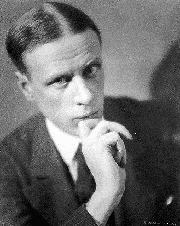On this date in 1885, Harry Sinclair Lewis was born in Sauk Centre, Minn. The novelist wrote such enduring classics as Main Street (1920), Babbitt (1922), Arrowsmith (1925) and the irreverent Elmer Gantry (1927). The title character, a preacher, is portrayed as a rogue and hypocrite who steals freethinker Robert G. Ingersoll’s “Love” as his signature sermon.
Lewis’ other books include It Can’t Happen Here (1935) and The God-Seeker (1949). An unbeliever since his days at Yale, from which he graduated in 1908, Lewis was married twice and had one son. In 1930 he became the first American to be awarded the Nobel Prize for Literature “for his vigorous and graphic art of description and his ability to create, with wit and humour, new types of characters.” (He had refused an earlier Pulitzer Prize.)
In his autobiographical sketch for the Nobel committee, Lewis noted that although he traveled widely, he had “lived a quite unromantic and unstirring life.” He was dubbed “the conscience of his generation” by Sheldon Norman Grebstein. (D. 1951)


